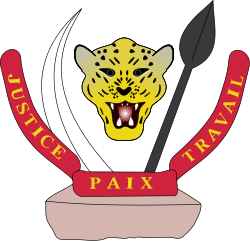Democratic Republic of the Congo general election, 2018
 |
| This article is part of a series on the politics and government of the Democratic Republic of the Congo |
|
Government |
|
Judiciary |
| Foreign relations |
| United Nations Mission |
General elections were originally scheduled to be held in the Democratic Republic of the Congo on 27 November 2016 to determine a successor to President of the Democratic Republic of the Congo Joseph Kabila.[1] According to the Constitution of the Democratic Republic of the Congo, the second and final term of President Kabila will expire on 20 December.[2]
Many candidates including Étienne Tshisekedi, Freddy Matungulu, Monique Mukuna Mutombo, and Emmanuel Weyi had announced their intention to run, but the election was postponed until early 2018.
Electoral system
The President of the Democratic Republic of the Congo is elected by plurality vote in one round.[3]
The 500 members of the National Assembly are elected by two methods; 60 are elected from single-member constituencies using first-past-the-post voting, and 440 are elected from 109 multi-member constituencies by open list proportional representation, with seats allocated using the largest remainder method.[4]
Delay
On 29 September 2016, the nation's electoral authority announced that the election would not be held until early 2018. According to the electoral commission's vice president, the commission "hasn’t called elections in 2016 because the number of voters isn’t known."[5] This announcement came ten days after deadly protests in Kinshasa against the rule of President Kabila which killed 17 people. The country's political opposition alleges that President Kabila had intentionally delayed the polls to remain in power.[2]
References
- ↑ Global electoral calendar NDI
- 1 2 "DR Congo election: 17 dead in anti-Kabila protests". BBC News. BBC. 19 September 2016. Retrieved 29 September 2016.
- ↑ Democratic Republic of the Congo IFES
- ↑ Electoral system IPU
- ↑ Wilson, Thomas; Mbatha, Amogelgang (29 September 2016). "Congo Election Body Proposes Two-Year Wait for Presidential Vote". Bloomberg BusinessWeek. Retrieved 29 September 2016.